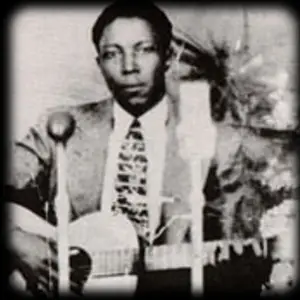ROBERT NIGHTHAWK
 Robert Nighthawk was an important figure in the transitional development of Blues from its Mississippi roots to its new home in the city. His slide-guitar work, with its combination of rhythmic drive and subtle one-string runs, was learned in the Delta juke-joints but its effects were heard many years later in the clubs and bars of Chicago in the post WWII era. Elmore James travelled the same route at the same time, and is often credited with bringing the slide-guitar to the city, but Robert’s assured, front-foot style had a great effect on the playing of Muddy Waters and Earl Hooker among many others, and his roots were so deep into the Delta soil he had trouble staying away.
Robert Nighthawk was an important figure in the transitional development of Blues from its Mississippi roots to its new home in the city. His slide-guitar work, with its combination of rhythmic drive and subtle one-string runs, was learned in the Delta juke-joints but its effects were heard many years later in the clubs and bars of Chicago in the post WWII era. Elmore James travelled the same route at the same time, and is often credited with bringing the slide-guitar to the city, but Robert’s assured, front-foot style had a great effect on the playing of Muddy Waters and Earl Hooker among many others, and his roots were so deep into the Delta soil he had trouble staying away.
Robert Lee McCullum was born in Helena AK in 1909 and played his Blues on the harp until taught the rudiments of slide-guitar by his cousin Houston Stackhouse when he was already in his 20s. The pair spent several years across the Mississippi from Helena, travelling round the Delta playing juke-joints and parties, where Houston introduced Robert to his old mentor Tommy Johnson, as well as Charley Patton and the rest of the pioneers of Delta Blues that would hang out in the Clarksdale area. They also played at the wedding of one McKinley Morganfield, who Robert would bump into later in Chicago when he was calling himself Muddy Waters. On his travels, Robert also met and played with Sleepy John Estes, John Lee Hooker and Memphis Slim. After a brush with the Law in 1935, Robert moved to St. Louis and began performing under the name Robert Lee McCoy. He travelled to Chicago where his stylish playing and strong, confident voice drew the attention of Bluebird Records producer Lester Melrose. Robert recorded several tracks for him, including ‘Prowlin’ Night Hawk’ which gave him an enduring new name, and his authentic Delta guitar sound got him session work with John Lee ‘Sonny Boy’ Williamson and others on the Bluebird label.
Eloquent single-string solo in this live recording;
While he was in Chicago, Robert fell in with Tampa Red who, along with Big Bill Broonzy, ran a kind of ‘clearing house’ for Delta musicians in South-side Chicago, but Robert couldn’t stay still long enough to become part of any scene. This man of few words was soon wandering the Delta again, playing anywhere he could find a gig. When he was back in Helena in 1942, he played with Rice ‘Sonny Boy II‘ Miller on the King Biscuit Time radio show on KFFA. The following year, Robert was sponsored by a different flour company, Bright Star, to host a show on the same station, often playing with pianist Pinetop Perkins. By the late 40s, Robert’s guitar style had developed a strong up-front edge, and when he was passing through Chicago in 1948, Muddy Waters persuaded him to sign for Aristocrat (later Chess) Records. Robert was a strange, quiet man who didn’t seem interested in a recording career, preferring to go down to Maxwell Street and play outside the market than work in the studio. Although his 1949 track, ‘Black Angel Blues’ was a hit, he didn’t fit in at Chess, perhaps being too close in style to Muddy. He left them for United Records where he recorded some rollicking Blues at some sessions in 1952, including ‘Bricks in my Pillow’ with Big John Wrencher. Robert’s only other recordings were done with a street-band on the corner of Maxwell Street in 1964 (where you can hear cars going past) and some studio work, some with his old mentor, Houston Stackhouse, at around the same time.